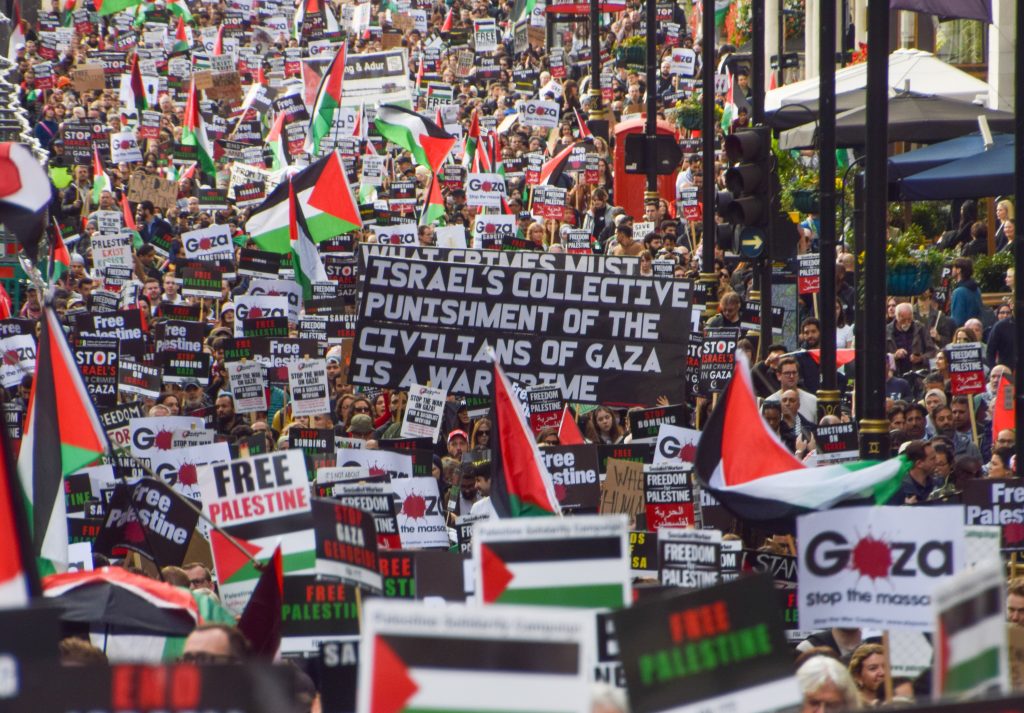A group of British Turkish Cypriots are calling for the community to march together at the National March For Palestine in central London on Saturday, 11 November.
The event, which will start at midday in Hyde Park, is an opportunity for people to call for an immediate ceasefire and to show their solidarity with Palestinians impacted by the war in Gaza, which has seen some 10,000 civilians killed and 1.5 million people displaced in the densely populated 25-mile long strip.
“Many Turkish Cypriots are already going to these protests on their own, so we thought it might be nice if we all went together. We know there are also many more Turkish Cypriots who are really upset about what is going on in Gaza, but they might lack the confidence to go to protests because they don’t know anyone else who is going,” said Ertan Osman from a newly formed Facebook group called Turkish Cypriots Against Genocide in Gaza.
Historic Palestinian-Turkish Cypriot ties
The distance between the shared capital Lefkoşa in Cyprus to Gaza in Palestine is just 250 miles. Historically, Turkish Cypriots have strong ties with Palestinians not only through the Ottoman Empire, but also because thousands of Turkish Cypriot women from poorer backgrounds were married to Palestinians in the early part of the twentieth century, when both territories were under British rule, meaning many Turkish Cypriots today have relatives in Gaza and the West Bank.
The life of embargoes and repeated forced displacement of the Palestinian people has triggered emotional responses from Turkish Cypriots too.
British Turkish Cypriot author Chimene Suleyman was among those to post about their family experience:
“I grew up never actually able to understand how my parents were forced into ghettos in their homeland in the Levant, my father, uncle, grandad all made prisoners of war, my other grandfather murdered — and the world just let it happen, then blamed us for it. But now I know.”
I grew up never actually able to understand how my parents were forced into ghettos in their homeland in the Levant, my father, uncle, grandad all made prisoners of war, my other grandfather murdered — and the world just let it happen, then blamed us for it. But now I know.
— Chimene Suleyman (@chimenesuleyman) October 19, 2023
A quarter of all Turkish Cypriots in Cyprus were forced to flee their homes when the Cyprus Conflict broke out in December 1963, many living in tiny enclaves across just 3 percent of the island’s territory. They endured a decade of persecution and oppression under Greek Cypriot rule until Turkiye militarily intervened in the summer of 1974, by which point some Turkish Cypriots had been made homeless at least three times.
Today, the fundamental rights of Turkish Cypriots are not only ignored by the Western powers, but are also routinely violated in order to appease Greek Cypriots over shared strategic interests.
Mr Osman told T-VINE that the march was the “perfect opportunity” for Turkish Cypriots “to turn up with TRNC flags and show our solidarity with the Palestinians whose cause is so similar to ours.”
The current Gaza War broke out after Hamas, a terrorist organisation that controls Gaza, launched thousands of rockets into Israel, while Hamas soldiers brutally attacked and killed hundreds of Israeli civilians and military personnel in southern Israel on 7 October. Hamas also seized over 240 hostages, among them days old babies and elderly citizens.
The 7 October attack, which left 1,400 people dead, marked the single largest loss of Jewish life since the Holocaust.
Self defence or collective punishment?
Israel has launched a major assault of Gaza since then, raining down bombs that have devasted the tiny strip of land, killing thousands of innocent civilians as they bid to rescue the hostages and also eliminate Hamas from their borders. Palestinians have been told to leave North Gaza to avoid the bombing only to find southern Gaza, including schools, churches, refugee camps, and hospitals, are also being bombed.
The Israeli authorities describe their actions as “self-defence” and that they cannot allow Hamas to regroup and mount similar future attacks, which the terror group has already confirmed they would. Israel’s campaign has been given strong backing by their allies, notably the USA, Britain and the European Union.
However, many others have been highly critical of Israel’s actions in Gaza, which has included cutting off electricity and water, as well as access to food and medicine. Multiple governments, including Turkiye, the United Nations and aid agencies have described Israel’s behaviour as “collective punishment” and stated it is in breach of international humanitarian law.
The International Red Cross said, “The instructions issued by the Israeli authorities for the population of Gaza City to immediately leave their homes, coupled with the complete siege explicitly denying them food, water, and electricity, are not compatible with international humanitarian law.
Amnesty International went further, stating that “documented unlawful Israeli attacks, including indiscriminate attacks, which caused mass civilian casualties and must be investigated as war crimes”.
Prior to this latest conflict, Gaza was already blockaded by Israel, which controls its air space, land borders and sea access, leaving many of the strip’s 2.2 million residents poverty stricken and dependent on aid.
At the same time, Palestinians living in the occupied West Bank, which also forms part of Palestine, have been subjected to even more Israeli settler violence. Often with the direct assistance of the Israeli military, Palestinians have been forced from their ancestral homes and lands.
The events form part of a long cycle of violence that has existed between Israelis and Palestinians since 1948 when Britain gave the territory its independence as two separate states. Since then, Israel has had to fight multiple wars to secure its existence, while Palestinians have found their lives and rights increasingly restricted.
What is genocide?
The UN definition of genocide states that ‘any act committed with intent to destroy, in whole or in part, a national, ethnical, racial or religious group’ constitutes a genocide. While the Israelis deny any such intent, many members of the far-right coalition government have publicly stated their desire to remove all Palestinians from Gaza and the West Bank, with one minister recently advocated dropping a nuclear bomb on Gaza.
Israel’s Jerusalem Affairs and Heritage Minister Amichay Eliyahu, a far-right politician who forms part of Netanyahu’s ruling coalition, said during a radio interview that he was not entirely satisfied with the scale of Israel’s retaliation since the October 7 massacre.
Eliyahu said that providing humanitarian aid to the Gaza Strip would constitute “a failure” by Israel, and advocating dropping an atomic bomb on Gaza a to “kill everyone” as a viable way forward.
Many other Israeli politicians have also called for the annihilation of Gaza following the 7 October massacre.
Main image, top, of protesters as they pass by Green Park, central London. Tens of thousands of people marched in central London on 21 Oct 2023 to show their solidarity with Palestine as the Israel-Hamas war intensifies. Photo © Vuk Valcic/ZUMA Press Wire/Shutterstock (14160377f)





